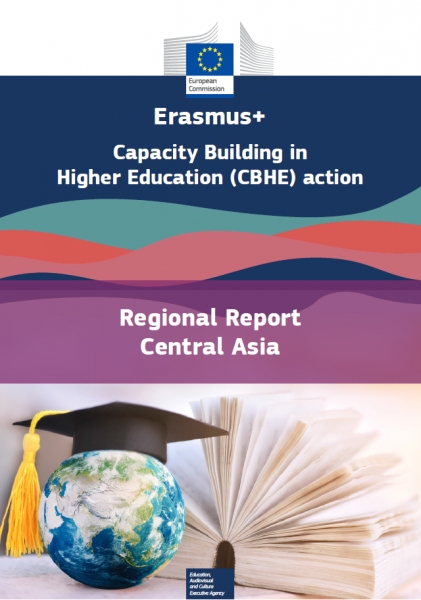E+ CBHE Action - Regional reports
The Erasmus+ Capacity Building in Higher Education (CBHE) action - Regional reports have been published by the Education, Audiovisual and Culture Executive Agency (EACEA) on its website https://eacea.ec.europa.eu/sites/resources/capacity-building-in-higher-education-cbhe-action_en.
The regional reports are based on the EACEA’s evaluation of the final project reports and monitoring of the first generation of Capacity Building for Higher Education (CBHE) projects selected for funding in 2015.
Altogether 138 projects were funded in 2015 and 88 finalised projects have submitted their final reports in 2019, among which 22 were implemented in Central Asia. The distribution of project per country is as follows: Kazakhstan 13, Uzbekistan 11, Kyrgyzstan 6, Tajikistan 2 and Turkmenistan 1.
The following part present the projects` activities in Uzbekistan (pages 17-18):
“The beginning of the new Erasmus+ programme coincided with a period of fundamental transformations of Uzbekistan’s higher education system implemented consistently with an impressive state backing of the reforms and improvements in school and pre-school education. The relevance of Erasmus+ programme has been considerably reinforced in 2017 with the adoption of the “Comprehensive Development Programme of the Higher Education System for 2017-2021” and, as of October 8th 2019, with the adoption of a “New Conception of Higher Education Development in Uzbekistan”. The TEMPUS programme and the CBHE action have assisted in constructing a basis for the reform process.
Uzbekistan started off with eleven projects in 2015, with the direct involvement of the Ministry of Education who contributes actively to the dissemination of best practice and project results. As of the beginning of academic year 2019/2020, seven newly developed Erasmus+ master programmes developed jointly with the European partners have been accredited by the Ministry of Education.
A certain number of CBHE projects, of which 20% are in engineering, assisted in establishing ECTS in Uzbekistan (561553 – Accessibility and Harmonization of Higher Education in Central Asia through Curriculum Modernization and Development / ACADEMICA and 561989 – Flight safety and airworthiness – a Master Programme / FSAMP).
Several projects also worked on the establishment of the ECTS with the result that it is currently utilised by a big number of HEI (more than 10). A strategic working group at the Ministry of Education is currently working on the implementation of ECTS with the target to switch to the ECTS in all Uzbek HEIs by 2030.
Agricultural, environmental and veterinary sciences have particularly been developed through CBHE projects (for example 561590 – Enhancing Competencies of Central Asian Universities in Agricultural Policy focused on Environmental Protection & Land Management / ECAP).
A network of universities in mathematical sciences was formed through project work (561574 – Establishment of Computing Centres and Curriculum Development in Mathematical Engineering Master program / ECCUM).
National projects usually achieve a higher impact than regional ones, as they focus on a specific national topic. NURSLIN project (561742-EPP-1-2015-1-PT-EPPKA2-CBHE-SP) managed to produce Guidelines on national qualifications framework (NQF) development in Uzbekistan, which were endorsed by the Ministry. An NQF Committee (Legislative Council of Developing Stages of NQ) was officially established and a ‘Classifier Database of Professional Qualifications for the Republic of Uzbekistan’ was produced.
